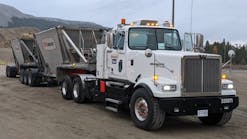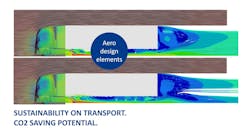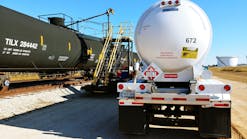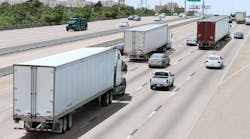The Environmental Protection Agency will enforce emissions requirements for “super-polluting” glider trucks after all.
Acting EPA administrator Andrew Wheeler said in a memo released late Thursday that “upon further consideration … I am today withdrawing this ‘No Action Assurance,’” meaning the agency will return to limiting sales of the remanufactured heavy-duty vehicles that feature new chassis and refurbished engines.
Former EPA Administrator Scott Pruitt ordered the agency not to enforce the annual cap on glider kits on his last day in office – in a parting shot to Obama-era “regulatory overreach.”
“This is a huge win for all Americans who care about clean air and human health,” said Fred Krupp, president of the Environmental Defense Fund. “These super-polluting diesel freight trucks fill our lungs with a toxic stew of pollution. EPA’s effort to create a loophole allowing more of them onto our roads was irresponsible and dangerous.
“We hope their decision tonight to withdraw that loophole puts a firm and final end to this serious threat to our families’ health.”
The decision follows an order by the US Court of Appeals for the DC Circuit that suspended EPA’s action pending emergency briefing. The DC Circuit ruled 2-to-1 last week to suspend implementation of EPA’s decision not to enforce modern pollution standards for super-polluting trucks. EDF, the Center for Biological Diversity and Sierra Club had filed a motion seeking the suspension. EPA’s withdrawal also follows legal action by a broad coalition of 16 state attorney generals who oppose EPA’s radical and harmful non-enforcement policy.
The legal battle began earlier this month when, with no public warning, EPA issued an assurance it would not enforce pollution limits on gliders with older diesel engines, which EPA testing found can emit lethal particulate pollution at up to 450 times the amount from modern, Clean Air Act-compliant engines.
A recent EDF-commissioned analysis, submitted to the court as part of the legal filings, indicated the additional glider trucks produced during EPA’s two-year non-enforcement policy could result in more than 1,700 premature deaths over the life of those vehicles.
Under America’s Clean Truck Standards, engines used in glider trucks must meet modern pollution standards. Pruitt tried to repeal pollution standards for gliders after meeting with executives from Fitzgerald Truck Sales, a Tennessee-based glider manufacturer, in May 2017 – the same manufacturer who prominently hosted an event for then-candidate Donald Trump early in his presidential campaign.
Pruitt’s attempt failed after comments underscored his proposal’s flawed legal reasoning, the White House and EPA Science Advisory Board raised concerns about the lack of supporting analysis, and a misconduct investigation was launched into the one study cited in the proposal, which was conducted by Tennessee Tech.
Pruitt’s proposal to repeal pollution standards for super-polluting glider trucks also faced extensive public opposition from EDF, the American Lung Association and other health experts, Moms Clean Air Force and other concerned citizens, and freight truck companies that make cleaner engines and would face unfair competition.
“After further consideration of the ‘No Action Assurance’ and information before me, including the administrative and judicial petitions and motions, and the application of agency guidance regarding no action assurances to these particular facts, I have concluded that the application of current regulations to the glider industry does not represent the kind of extremely unusual circumstances that support the EPA’s exercise of enforcement discretion,” Wheeler said.









